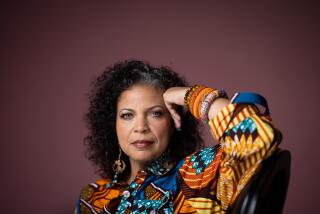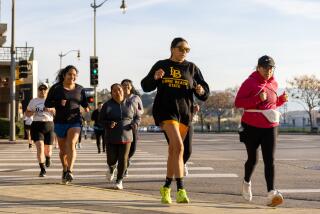Sobering Turn of Events for Activist Group
- Share via
Into her flock, Tina Pasco each week welcomes at least one more angry victim: another mother grieving for a child lost to a drunk driver. One more mother determined to see justice.
A former housewife who lost her sister to a drunk motorist 12 years ago, Pasco learned firsthand how to harness her anger and follow the driver’s case through court, pressing for punishment that was swift and severe.
Since then, she has shown others the way, as the local victim services director for Mothers Against Drunk Driving, shepherding hundreds of bereaved survivors through the emotional labyrinth of the Los Angeles court system.
But Pasco’s sobering mission could be in jeopardy.
Mothers Against Drunk Driving, which once made national headlines with its aggressive grass-roots campaign against alcohol-impaired drivers, is retrenching in Los Angeles.
Citing lackluster donations and still reeling from the loss of its Van Nuys headquarters in the 1994 Northridge earthquake, the group has been forced to cut its staff and had to temporarily shutter one of its local offices.
The cutbacks leave just Pasco and one part-timer to serve the car capital of the nation, a city with the dubious distinction of leading the entire country in automobile accidents per capita.
Last month, the group laid off three full-time workers. And as the New Year’s holiday approached, MADD’s local chapter was forced to shut down its main North Hollywood office for a few days, leaving a lone tape recording advising tipsy revelers to call a cab before getting behind the wheel.
Organizers have tried to remain upbeat. The sluggish economy, they say, has dried up donations, siphoning off the lifeblood of philanthropy that turned MADD into one of the country’s most powerful public service campaigns since it was founded in 1980.
MADD officials in the organization’s Dallas headquarters point out that many programs are still alive and well. Convicted drunk drivers are often ordered by judges to attend MADD-sponsored seminars at which the families of DUI-related victims describe alcohol’s impact on their lives.
And local MADD chapter President Mark Robinson said the group will keep open two donated offices in North Hollywood and West Los Angeles, staffed by a pool of 50 volunteers.
But privately, MADD organizers acknowledge that the group that has become synonymous with the phrase “Don’t Drink and Drive”-- and has been instrumental in helping to reduce alcohol-related deaths on the nation’s highways by 40% since 1980--may have become a victim of its own success.
In the fiscal year ending in June 1995, contributions fell nationwide to $41.2 million, down from $47.7 million the previous year.
The local picture is more disheartening: The Los Angeles chapter that had little trouble raising $1.5 million in annual contributions 10 years ago mustered less than $100,000 in 1994, an official for the organization said.
“We’ve taken a big hit, that’s for sure, but ask local retailers what kind of business they’ve done recently,” said Robinson. “They got killed, just like us. Nobody’s spending money.”
MADD organizers compete with more than 2,700 other nonprofit organizations in Southern California. Many, such as those working toward a cure for AIDS, are more glitzy than MADD.
Said Robinson: “Unlike some charities, we don’t have Liz Taylor and Elton John showing up at our fund-raisers.”
MADD suffers from a strange public relations dilemma. Robinson and other officials believe that would-be contributors assume the group to be so large that it doesn’t need their donation check. They say others wrongly guess that MADD is government supported.
To make matters worse, there are signs of internal strife at MADD.
Several former employees have written letters to the Registry of Charitable Trusts at the state Department of Justice--the agency overseeing such charities--complaining about “irresponsible” use of MADD’s public contributions on extravagances.
The department never responded to the letters, which were short on specifics, and did not return a reporter’s phone calls last week. The letter-writers declined to be named.
Robinson and Pasco consider the letters the work of “disgruntled employees with axes to grind.” Robinson said the charges predated his involvement with MADD.
Still, MADD’s mission remains critical.
More than 16,500 people nationwide were killed last year in alcohol-related accidents and another million were injured.
But slowly, the mayhem is declining, statistics show--a fact authorities attribute to new seat belt laws, vehicle air bags and the work of MADD.
The number of drivers arrested countywide for drinking and driving dropped from 20,721 to 17,605 between 1993 and 1994. Statewide, the drop was from 105,698 to 90,515 over the same period, according to the California Highway Patrol.
Fatalities connected with DUI accidents have plummeted 50% in Los Angeles, from 89 in 1990 to 44 in 1995, LAPD statistics show. Also, the number of drivers killed on freeways statewide in alcohol-related accidents dropped from 2,382 in 1990 to 1,488 in 1994.
“It’s obvious that people are thinking twice about drinking and driving,” said Sgt. Ernie Garcia, a CHP spokesman. “And MADD definitely has a role in that.”
MADD organizers say they’re trying to cope with the financial crunch by devising new ways to earn money--including creation of a new snack food called MADD Munchies that they hope to market through retail outlets nationwide.
With 10% of the profits from each snack package sold coming back to the group’s coffers, MADD hopes it has finally found a “sustainable funding vehicle that will get us through the tough times.”
More to Read
Sign up for Essential California
The most important California stories and recommendations in your inbox every morning.
You may occasionally receive promotional content from the Los Angeles Times.











